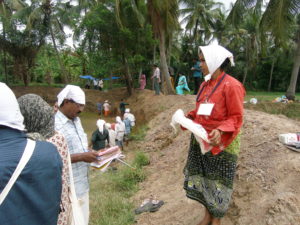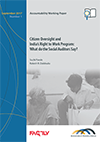
Fighting Corruption Through Social Audits in India: How Far Can Voice Get Without Teeth?
Date: April 2022
Author(s): Suchi Pande and Jonathan Fox
Publication type:
Published by: The Global Anticorruption Blog
Note: This blog was originally published by The Global Anticorruption Blog on April 28, 2022.

Auditors inspect an NREGA worksite in Kerala. Photo: Suchi Pande
India’s National Rural Employment Guarantee became a lifeline for migrant labor arbitrarily expelled from cities and left stranded and broke due to COVID-19 lockdowns. One of the largest employment safety net program in the world, it comes with a mandate for state governments to carry out “social audits,” a procedure empowering its beneficiaries to monitor leakages and the denial of rights resulting from the arbitrary exercise of power across India’s 600,000 villages. In short, to spotlight corruption. How? With a social audit, program beneficiaries publicly scrutinize its implementation and government actors must respond to shortcomings in officially convened public forums and redress grievances. The audits date to a 2005 law driven by a combination of a grassroots advocacy campaign and a reform-minded government. Social audits can engage populations directly in the fight against corruption where:
- the audit reveals corruption in some form, such as the leakage (embezzlement) of program funds, demands for bribes to release the funds, or the outright denial of participants rights to the funds;
- those conducting the audit have the capacity to communicate their findings clearly and understandably to the affected individuals or group;
- those affected are informed of the findings and understand the violation of the law or policy that led to the losses; and
- a third party — government agency or civil society group — convenes a public forum where government officials and elected representatives discuss the audit findings in an atmosphere free from reprisal, where the affected persons can participate and vouch for the accuracy of findings.
If governments do not take followup actions in response to social audit finding, they are not likely to transform the material outcomes of social programs. But the cumulative effect of many audits can build the civic capacities of citizens to reconfigure their relationship to the state and push governments to be more responsive. The most widespread, institutionalized form of social audits to oversee government programs is in India. Citizens organized to make them happen, first independently and then by advocating for the government to build them into large-scale social programs. Daily wage workers, the poorest of the poor, demanded their grievances be heard and the perpetrators held accountable. The public hearing or jan sunwai that emerged to hold elites and power holders accountable in the northwestern state of Rajasthan was later institutionalized as NREGA social audits. These government-led social audits are backed by the 2005 law. Progress has been uneven. Even with high levels of political and bureaucratic backing for social audits in Rajasthan, where social audits originated, government-led social audits were stalled due to counter-mobilization by lower level village officials and elected elites. In the absence of an autonomous social audit agency, the process was viewed by frontline bureaucrats and elected elites as closely aligned with interests of transparency and accountability activists, and they opposed it. This kind of organized opposition by anti-accountability forces pushed advocates to seek out other third party actors to build legitimacy for social audits. It took more than a decade for most of India’s states to begin to comply with the national mandate to carry out social audits, prompted by orders from the Supreme Court in 2018 and the supreme audit institution in 2015. A national level consultation process had produced a set of national auditing standards, including insights from grassroots organizers, which had called for independent state social audit units (SAUs). The institutionalization of social audits is still ongoing and the process remains to be documented in detail, but the Center for Social Audit of the National Institute of Rural Development and Panchayati Raj has been monitoring the process. In 2019, at least 51 per cent of all village councils (gram panchayats) across 25 states were covered by NREGA social audit. In states that have independent social audit units, these units are responsible for implementing social audits. Based on the recent progress, state government social audit agencies can be categorized into high autonomy/capacity, intermediate, and weak, based on their varying degrees of independence from state governments, its transparency and accountability, and financial autonomy. Since 2016, some 16 states have created independent social audits units—the heads of these units are not from government—and in 10 states the units have financial autonomy from main NREGA implementing agency. Social audits have been extended to 9 other government programs: for example, maternal and child nutrition, national food security program, juvenile justice, and education. While other countries permit citizen oversight of social programs, India’s approach to social audits is distinct because autonomous state agencies validate the social program performance and the commitment to present and debate the findings in public forums with those directly affected. If organized well social audits with their open public forums remain a powerful deliberative forum to push for greater downward accountability. According to frontline social auditors—majority of who are Dalit or lower caste youth—from one southern Indian state (Telangana), we find NREGA social audits help deter corruption. For example, more than half of the frontline auditors reported that 50% of the social audits they facilitated helped in deterring corruption. They also solve individual grievances, the social audit agency reported a high resolution rate (30%) on worker complaints that are resolved during door-to-door verification phase, where auditors have sufficient autonomy – awareness about bottlenecks and clout to escalate the issues – to resolve grievances. However, the job of full-scale anti-corruption investigation and enforcement falls to other government agencies. More than half of the frontline auditors reported lack of state respnsivenss—action taken on fraud and support from senior bureaucrats—as a major obstacle in making social audits more effective. Where governmental social audit units have both autonomy and capacity, they can both identify and deter corruption – at least the kind that is potentially visible through local monitoring. To carry out investigations of underlying causes or to prosecute law-breaking, however, requires independent enforcement agencies – which only 2 of India’s states have. Social audits are important because they have potential to bridge the gap between anti-corruption constituencies in government and society. But voice is not a substitute for teeth – the world’s largest scale experiences with social audits still leaves open the question whether and how voice can activate teeth. So far, both public and official attention has focused on whether social audits are held, but full institutionalization of this anti-corruption innovation needs to include the creation of independent enforcement agencies that can respond to voice with teeth.
Jonathan Fox is a professor at the School of International Service at American University, where he directs the Accountability Research Center. He works with a wide range of public interest groups, social organizations, private foundations, and policymakers to learn from transparency, participation, and accountability initiatives.

